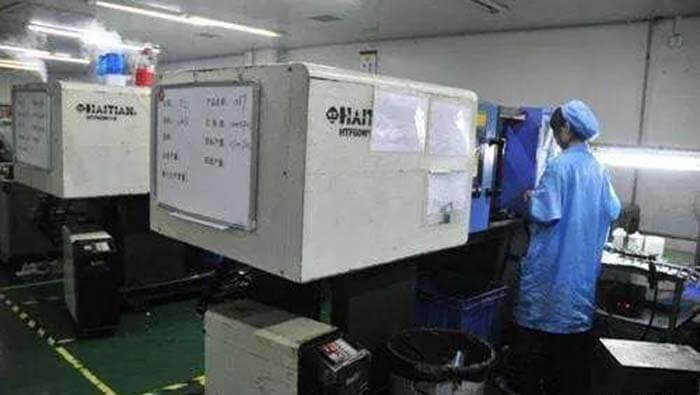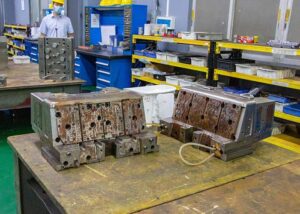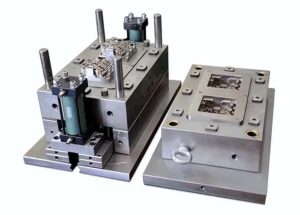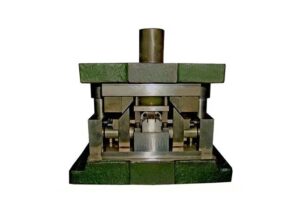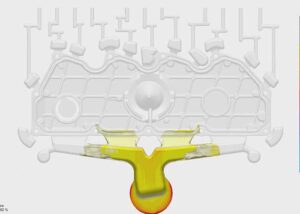What is the injection cycle?
The injection cycle is the injection cycle of a hydraulically driven injection molding machine from the start of mold clamping to the next mold clamping. Mold clamping is generally divided into four stages, fast mold clamping, slow mold clamping, low-pressure mold protection, and high-pressure mold clamping.
The injection starts after the high-pressure clamping is completed, and is also divided into multiple sections. The molten plastic fills the cavity during the injection. When the cavity is filled, the pressure rises sharply, so the end of the injection is also called the packing phase. When the control is not appropriate, the finished product will have burrs.
The holding pressure starts after the injection is completed. The cooling starts after the cavity is filled, that is, it starts from the pressure holding. When the mold cools, the finished product shrinks under the cold. The function of holding pressure is to pass through the cold runner that has not yet solidified and fill the recesses formed by the shrinkage at a holding pressure generally lower than the injection pressure so that the finished product is full (without dents) when it is demolded.
When the cold runner is solidified, it is meaningless to hold the pressure again, and the pressure can be terminated. The holding pressure can be divided into multiple sections, and the holding pressure of each section is different (usually decreasing step by step), which is divided by time.
The total holding time is determined by the weight of the finished product or the absence of dents on the finished product. Adjust from a short holding time, and add a little holding time for each injection, until the weight of the finished product no longer increases or dents are acceptable, the holding time does not need to be increased.
The cooling time parameter set on the injection molding machine is a period from the completion of the pressure holding to the opening of the mold, but the cooling begins as early as the mold cavity is filled with plastic. The purpose of the cooling time is to make the finished product continue to cool and solidify so that it will not be deformed by the ejection when it is ejected. It should be said that the cooling time is derived from the experiment.
Injection Mold Clamping
Recently designed toggle-type injection molding machines have regenerated mold clamping oil circuits in order to strive for higher mold clamping speed. It is suitable for use under the premise that the mold is not subject to high impact.
High-pressure mold clamping
The use of the lowest clamping force that can prevent the finished product from producing burrs can shorten the time required for the high-pressure clamping section. Moreover, the tie rods, toggles, and templates of molds and injection molding machines will also extend their life due to the use of low clamping force.
If a mold with a clamping force of 50t is sufficient, there is no need to use a clamping force of 51t, even though your injection molding machine has a higher clamping force.
Injection molding
The highest injection molding speed can be used when the finished product does not produce bubbles or black spots due to scorched plastic. Especially for thick-walled injection molding, a large amount of air-storing space in the mold cavity is filled with molten plastic.
Too high injection speed prevents the air in the cavity from being discharged out of the mold, resulting in bubbles.
Using the lowest injection pressure can correspondingly reduce the required clamping force (expansion force) while using the lowest barrel temperature can shorten the cooling time.
Hold pressure
The shortest holding time can be determined from the weight of the finished product or the acceptable dent. There are many thin-walled products that do not need to hold pressure because the inner layer of the finished product is basically solidified immediately after the injection molding is completed.
Cooling time
The mold is a heat exchanger. Yes, the mold continuously takes away the heat of melting through the cold water channel, and a properly designed mold can improve the efficiency of heat exchange. However, if allowed, ice-water cooling can shorten the cooling time.
If the ice water is cooled to make the mold condensate, the dry air blower and the sealed mold clamping device can reduce the degree of dew point and prevent condensation.
If the plasticizing capacity is not enough and it becomes a bottleneck, the following treatments can be done during screw design and parameter adjustment:
- Barrier screws can increase plasticizing capacity.
- Large diameter (C) screws can increase plasticizing capacity.
- Increasing the groove depth of the screw can increase the plasticizing capacity.
- Increasing the speed of the screw can increase the plasticizing capacity (some plastics that are sensitive to shear, such as PVC, PET, etc., cannot use this method).
- Reduce the back pressure as much as possible, otherwise, it will increase the plasticizing speed.
- The hydraulic sealing nozzle is adopted, so that the mold can be plasticized when opening and closing the mold.
- The use of a pre-plasticizer design enables the screw to be plasticized during the cycle except for the injection and holding time.
- Adopt a pressure-holding device, so that the screw can be plasticized in the pressure-holding section.
Injection mold
Open the mold at the highest speed without tearing the finished product and producing a loud mold opening noise. Some sophisticated injection molding machines have decompression equipment before mold opening, and even high-speed mold opening will not produce noise. In order to achieve an accurate mold stop position under high-speed mold opening, a brake valve or closed-loop control can be used.
Eject
On small injection molding machines with low ejection force, pneumatic ejection can be used, which is higher than hydraulic ejection speed. Electric ejection is faster than pneumatic ejection.
The injection mold can be designed to be ejected by the mold opening action instead of the ejection device on the injection molding machine. This method can only be ejected once. This is the simplest method of ejecting while opening the mold.
Using an independent oil circuit, gas circuit, or circuit control, it can realize the function of multiple ejections while opening the mold while ejecting.
Equipped with video and computer equipment, it can quickly analyze whether the finished products are all dropped after one ejection. The second ejection is performed when not all of them are dropped, so 99% of the cycles in the above example are ejected only once, which saves the average cycle time.
Retreat
The multiple ejections of some finished products can be ejected by the vibration of the injection molding machine. The thimble does not need to be fully retracted each time to shorten the time of multiple ejections.
The last ejection can be started at the same time as the mold clamping. Since the stroke of the thimble is shorter than that of the template, the thimble will always be fully retracted before the mold is locked.
Shortest injection cycle time
The shortest injection cycle time consists of the time required for mold closing, injection, pressure holding, cooling, and mold opening.
Feeding is carried out at the same time during the cooling time and mold opening and closing, and even while maintaining pressure.
Multiple ejections are performed at the same time when the mold is opened, and the last ejection is performed at the same time when the mold is closed.
In this case, up to three actions can be performed at the same time, and each action has an independent drive. It may be that all three are oil circuits (such as three oil pumps), and all three are circuits (electric injection molding machines) or a combination of oil circuits, air circuits, and circuits.
Electric injection molding machines generally have 4 servo motors to drive injection molding, feeding, opening, closing, and demolding respectively. The advantage is that the parallel operation can shorten the cycle. The hydraulic injection molding machine can also achieve this goal when using 3 independent oil circuits. Therefore, this advantage is not a patent for electric injection molding machines.
Since injection cannot be made when the mold is opened, the four servo motors cannot operate at the same time. The analysis in Figure 10 shows that the shortest period of three parallel actions has been reached.
Idle time
Many injection molding machine specifications indicate the dry-running time, but generally, it is only calculated theoretical time, ignoring the acceleration and deceleration of the template, and of course, the quality of the moving mold is not calculated, which is shorter than the actual mold opening and closing time.
According to Euromap’s standard, the idle running time is the time required for the opening and closing of the template, and the opening and closing stroke is set at 0.7 times the four-column space. In the shortest cycle, only mold opening and closing time (idle running time) and injection time are related to the design of the injection molding machine.
Thin wall injection molding
Thin-wall injection molding is defined as injection molding with a wall thickness of 0.5 mm or less, or a process/wall thickness ratio of 300 or more. In order to prevent the molten plastic from solidifying before filling the cavity, thin-wall injection molding is high-speed (and high acceleration and deceleration) injection molding.
The so-called high-speed injection molding means that the forward speed of the screw is above 300 mm/s. Under high-speed injection molding, the injection time is generally within 0.5s. The high-speed injection is assisted by accumulators. The oil pump fills the accumulator during the cooling time, or a small oil pump can be used to fill the accumulator during times other than injection and pressure holding. The stored high-pressure oil is released during injection, which can generally increase the injection speed by 3 times.
Blow demoulding
If the product can be demolded by blowing, it is easy to blow while opening the mold. Generally, the air blowing is delayed after the mold is opened to hide the demolding time in the mold opening time.
Pneumatic demoulding
Pneumatic ejection is realized on a small injection molding machine that requires little ejection force so that mold opening and closing are parallel to ejection and ejection, which saves about 1s of ejector action time, which is considerable on small injection molding machines. , And finally reached a cycle time of 2s.
The cost of an injection molding machine with three independent oil circuits is relatively high. Two parallel-action injection molding machines generally use one oil circuit for the clamping device and another oil circuit for the injection device. This is based on the general division of injection molding machines.
Consider the oil circuit board of the clamping device and the oil circuit board of the injection device.
A hybrid oil-electric injection molding machine integrates the advantages of two drives and is ingeniously matched. The general design is electric feeding and other actions of hydraulic pressure, such as Husky’s Hyelectric injection molding machine.
Double pump injection molding
The dual pump design uses only one oil pump during the injection molding. The oil circuit can be slightly changed so that the two pumps are used for injection, thereby increasing the injection speed to nearly double.
Hot runner mold
The hot runner can shorten the cycle in many ways.
- If the diameter of the cold runner is larger than the thickness of the finished product, the cooling time will have to wait for the runner to cool to a certain extent before the mold can be opened, but the finished product has already cooled, causing waste. The runner of the hot runner mold does not need to be cooled, and the finished product determines the cooling time.
- The amount of plastic in the cold runner is a percentage of the amount of the finished product, even if it is heavier than the finished product, the injection and feeding time will be lengthened. The use of hot runner molds saves the injection and feeding time required for runner plastics.
- There is a nozzle in the cold runner, and the mold opening stroke should be increased.
- In multi-cavity injection molding, the cold runner does not guarantee whether the finished product will fall or not. It needs to be taken out with a robotic arm (full automatic operation) or manually (semi-automatic operation), and the cycle will be slowed down.
You may also be interested in the below articles.
Summary Of 50 Injection Mold Structure Operation Dynamic Diagrams
Auto Parts Stamping Die Design Concept
